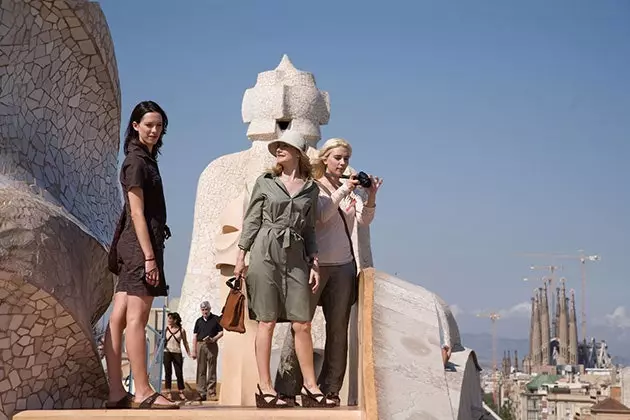
Being a foreigner in Barcelona
According to the RAE's definition, a foreigner is (among other things) a foreign tourist, but when a Barcelonan says that "the city is full of foreigners" he often also refers to the many foreigners who inhabit it. I am one of them. I arrived in Barcelona as an Erasmus student before A Loud House was released (that French film that wanted to be an ode to European multiculturalism and good vibes) and I'm still here.
There are a handful of things that anyone who wants to settle in Barcelona from abroad should take into account.
THE FLOORS
How cute are those apartments in the Eixample with their hydraulic tiles and their Catalan vaulted ceilings! Of course: it will cost you a lot up the stairs and down the stairs to learn that a first floor is a real third floor. Mezzanine and main, nice to meet you.
BUTANE, BUTANEE!
You go through the streets of the old town and those gentlemen who walk orange carboys down the street and hit them shouting "Butanooo!" they seem curious and exotic to you. When you get in the shower and suddenly the water starts to get cold, you will remember them a lot and you'll run downstairs in flip flops to chase after them and take yours or (more likely) pay a little more to have it brought up.
THE LANGUAGE
Two languages are spoken in Barcelona. One is Catalan. The classic of the classics. The first thing you discover (because in your country no one had told you) and it shocks you. First it will give rise to endless and sometimes tiresome discussions with locals and other foreigners, then you will get used to it, finally you will master it and you will learn that there are expressions as beautiful and untranslatable as Déu n'hi do or home, i tant!
Of course, whatever your mastery of "the language" is, one thing is clear: don't let anyone ask you about the names of the streets in Spanish because, even if you don't speak a word of Catalan, you don't know it (but what invention is that on Calle de San Pablo?) .
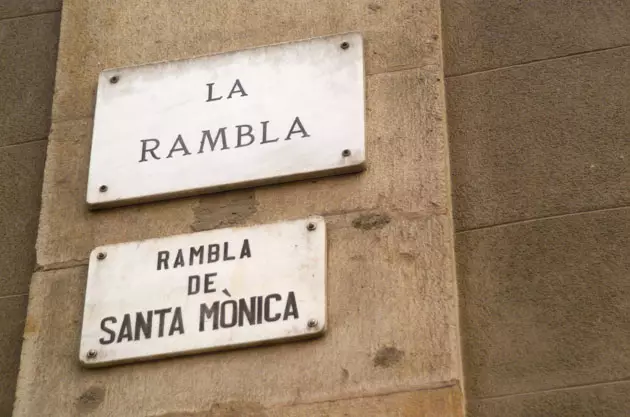
The Rambla de Santa Monica
THE HOURS
It doesn't matter how many years you've been in Barcelona and how well you speak Catalan, not even doing a master's degree will you be able to learn to tell the time correctly!
PA AMB TOMÀQUET
Perhaps the most typical Catalan dish is the simple (and delicious) bread with tomato and a little oil. And if it is true that they also have it in Italy and it is called bruschetta, in Catalonia they have gone further and have extended their use to the sandwich . It doesn't matter if you order it with ham, with an omelette, with tuna or if you spell it out loud “a sandwich of fuet SIN-TO-MA-TE, please”, he will always carry it. Or you love it, or hate it.
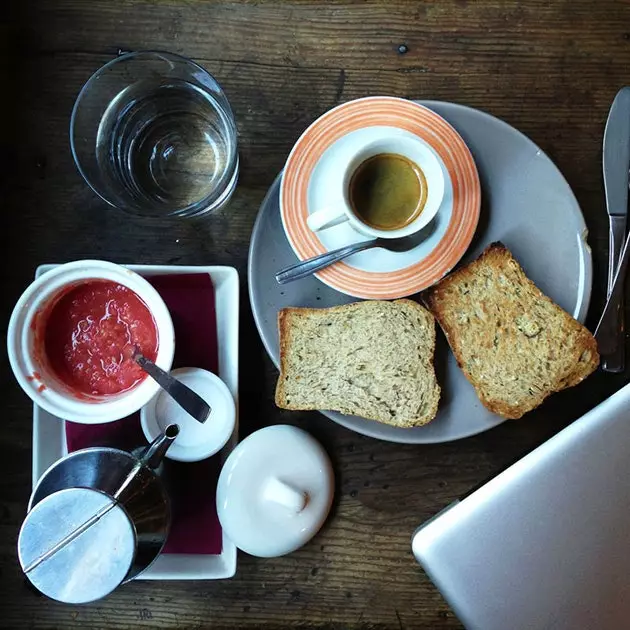
Coffee and pa amb tomàquet
SOCKS
Another typical specialty is calçots. A delicacy that looks like a leek and is not, which is eaten grilled, with romesco sauce and is used to open the stomach for the meat that will come during a social act, the calçotada, which if you live in Catalonia will become a obligatory annual appointment with your friends, between February and March. You will start with a vermouth around 1:30 p.m. and you do not know how and when you will finish.
COFFEE
If you're a foreigner, you can't help but wonder why the coffee is served in glass cups that burn the fingertips and not in (for us normal) porcelain cups. If you're Italian, you won't be able to understand why when they prepare the Cortado they heat the milk, they make the coveted foam, but then they never serve it to you.
Even so, you will never be able to finish a binge without **a triphasic or a carajillo (clearly in a glass)**.
A BIKINI AND A NATURAL WATER
If you have learned Spanish in Barcelona, it will take a while to discover that nowhere else do they understand you if you ask for a **“bikini” (a mixed sandwich) ** and “a natural water” if you want it from the weather.

Calçot, the king
BE CAREFUL WITH THE JET
You are in a bar at night, you have gone out without an umbrella because the sunset was beautiful and, when you return home, you notice that the street is wet. You worry about your laundry that you have left hanging outside and it takes half a second to realize that no, it has not rained. In Barcelona every night they clean the streets of the center with water hoses. At first it seems strange to you, you wonder if it is not a useless waste, or where all this water comes from, then your only concern becomes avoiding the pressure jets and try not to get your feet wet and slip.
“ARE WE STAYING?” “IN THIS WEATHER?”
In Barcelona the weather is generally wonderful. Yes indeed: Don't even think about asking someone to go out if two drops fall or if the temperature drops below ten degrees Celsius . If you suggest it, your local friends will start to look at you strangely and make any excuse not to set foot on the street. And if it eventually snows (which, luckily, hardly ever happens), pray that these four or five snowflakes catch you at home; if not, it could take hours to get back to your home. Those who don't believe me, ask any Barcelonan about how it went in the already mythical snowfall of March 8, 2010.
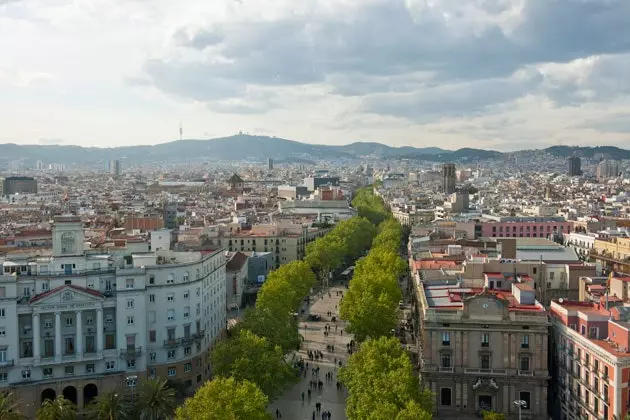
La Rambla, that elusive mess
GO, GO, HERE IS THE BEACH
Whether you come from Milan, Paris, London, Berlin or Stockholm, you will be the envy of all your compatriots: you have a summer that lasts five months and a beach a few metro stops from the office and you want to take advantage of it. But, to which you have integrated a little, you will discover that Barceloneta, with its hubbub, its vendors and masseuses (and its thieves) is only for tourists and that to spend a day at the beach it is better to do what purebred Barcelonans do: flee the city.
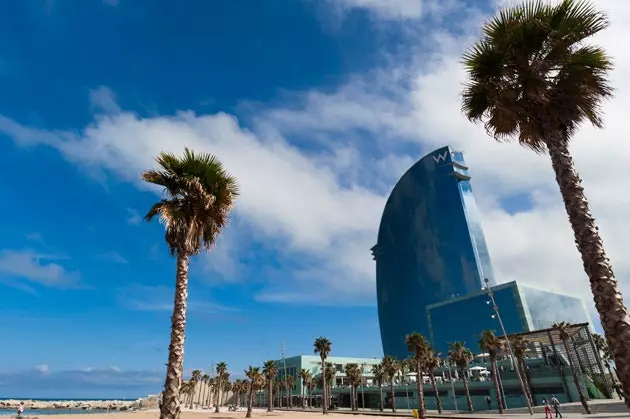
La Barceloneta: popular and seafaring tradition
LUNCH
The subject of schedules is possibly the most topical of the topics about what happens below the Pyrenees. At first it will be difficult for you to understand that your co-workers stop between eleven and twelve to put a sandwich between chest and back , but you will soon realize that if you want to make it to your 2:00 p.m. lunch break alive, you have no choice but to give in to this pleasure.
SANT JORDI
If you have a Catalan partner, it is most likely that they will ignore you on Valentine's Day, but then Sant Jordi (April 23, patron saint of Catalonia and International Book Day) arrives and gives you a book and/or a rose (or both things, the generous). Whether you are in a couple or not, as a good foreigner, you will never forget the emotion of your first day of Sant Jordi: the Ramblas (and not only) are filled with roses and books, writers and parties; people line up to get the autograph of their favorite author in a wonderful atmosphere that smells of paper, ink and flowers.
YES TO PUBLIC TRANSPORT
No matter how much you complain about the (blatant) price increases of the tickets, you will recognize that one of the advantages of living in Barcelona is being able to do without the car; You will go everywhere with public transport at any time of the day and night. And, even if you hate the corridor that connects line 4 and 2 with line 3 (Paseo de Gracia station), you will always be happy to be able to go out without thinking that you cannot drink because you have to drive.
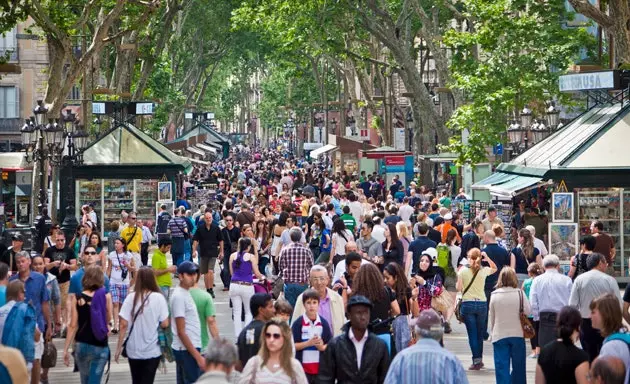
The Rambla of Barcelona
ESCHATOLOGY
It is not something that you find out about right away, but once you spend at least a few Christmases in Barcelona, you will begin to wonder where this great eschatological interest that its inhabitants have comes from. If you take a walk through the Santa Lucía market (in the Plaza de la Catedral during the month of December) it will be impossible not to notice the stalls that they sell the cagatió and the caganer, they are two essentials of the Catalan festivals . They may seem kitsch or not, but you can not deny that they are cute.
THE CITY AND ITS NEIGHBORHOODS
As a good foreigner who arrives in Barcelona, the first day you will discover Plaza Cataluña, you will go down Las Ramblas (which you will only learn to avoid later) and you will get into the Gothic, from there to the Born with its Santa María del Mar (yes, it is the church which Falcones talks about in his book) and in no time you will reach Barceloneta beach. Then in the Eixample you will fall in love with modernism and you will get sick of Gaudí. Going down from Park Güell you will pass through Gracia and decide that is where you want to live , with its small squares, its terraces, and this atmosphere that mixes young progressive glasses, grandparents and handsome parents with handsome children. But later you will lose your fear of the Raval, you will get the point, you will see that there are not as many tourists as in the Gothic and you will feel very comfortable in its bars and nightclubs. Finally, when you have been there for a while, you will also enter other areas such as Poble Sec and Sant Antoni (now on the crest of the wave) or Poble Nou, until you reach the Sants festival, the Horta labyrinth or the patatas bravas at the Tomás de Sarrià bar.
But only by climbing Tibidabo and contemplating the city from above, will you understand that the explanation your guide gave of the name of this hill is completely true and that settling in Barcelona has been perhaps the best decision of your life.
* Andrea Tommasini is Italian, he has been in Barcelona for eight years. He is the press officer and community manager of RocaEditorial.
***You might be interested in him too...**
- Arriving in Madrid: chronicle of an adventure - 22 things about Spain that you miss now that you don't live here
- 46 things you'll only understand if you're from Barcelona - 30 things you'll only understand if you're a pro from San Sebastian - You know you're Galician when... - Advantages of being Spanish - All humorous articles
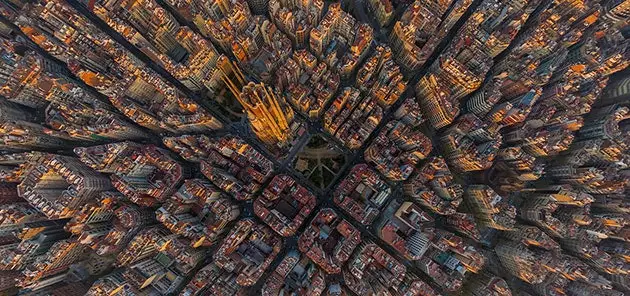
In Barcelona it is easy to find your way around
